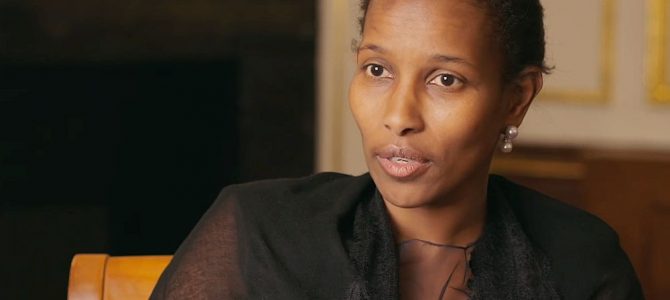
Last week, the Southern Poverty Law Center released a list of 15 anti-Muslim extremists, including writers, intellectuals, and activists. This “Field Guide” is meant to help journalists tell the “good guys” from the “bad guys” by providing them with ammunition against outspoken critics of Islam.
The people on this list are lambasted for talking about violence in Islam, unequal treatment of women, the increasing number of Islamist advisors to our government—including Muslim Brotherhood-backed groups like the Islamic Society of North America and the Center for American-Islamic Relations—and the growing treatment of Islam as a protected class, mostly at the behest of the aforementioned Islamist groups.
This guide called what these writers and thinkers produce “propaganda” that’s “baseless” and “exploitative” of terrorist attacks. It accuses them of “demoniz[ing] the entire Islamic faith” and “inspiring hate-based violence.” Importantly, the SPLC used the term “extremist” to describe the people on their list (that’s left-speak for “terrorist”).
One of the individuals they profiled is author and women’s rights activist Ayaan Hirsi Ali, who works to end the cruel practice of female genital mutilation in the Muslim world. She’s also known for co-producing a short film on women’s rights with Dutch filmmaker Theo Van Gogh. He was brutally stabbed after an attempted beheading by a Dutch-Moroccan Muslim, who also threatened Hirsi Ali’s life.
People Who Talk Are Bad, People Who Shoot Misunderstood
But if Hirsi Ali, who has called for an Islamic reformation, is tantamount to a terrorist, then what does that make the Orlando shooter or the San Bernardino attackers? We’ve reached a point of absurdity in our national conversation on Islam, where religious terrorists are just misunderstood or mentally ill, but activists working against the persistent problem of violence in Islam are terrorists.
The Left shies away from terms like “Islamic terrorist,” and “Muslim extremist,” opting instead for the uber-sensitive and inchoate “violent extremism,” as though one could be an extremist about nothing in particular. That’s because they reject any association between Muslims and violence, no matter how many terrorist attacks are carried out in the name of Allah. Because groups like the SPLC refuse to acknowledge this relationship, even in its weakest form, they consequently view any mention of it as anti-Muslim.
This of course doesn’t mean that all Muslims are terrorists. (That should go without saying, but given the new standard for “extremism,” one can never be too careful.) Yet that’s the view the SPLC wants you to think these intellectuals are advocating. It’s in the best interest of Islamists, and those defending them, to pretend there’s one monolithic “Islam,” and people like Hirsi Ali are nothing but Islamophobes.
By doing this, they can make legitimate criticism of the practices of some, or even many, Muslims into a blanketed attack on the entire religion. From there, they can call those critics “anti-Muslim,” detracting from any meaningful conversation about the threat of a legitimate strain of Islam—namely Islamism.
The Real Bigotry Is Making Excuses for Muslims
The 15 people on the SPLC list are accused of inspiring violence, a vague but ominous crime. This same argument has often been used to defend censoring images of Mohammed, especially critical ones. Leftists, and many Muslims around the world, consider any criticism of Islam the same as inspiring violence, and they use this to shut down speech. But fear of violence, or fear of being called a provoker of such violence, shouldn’t deter what and whom we criticize. Especially not in America, where freedom of expression has been enshrined in our Constitution.
The SPLC holds a double standard for Muslims in America. What’s acceptable to criticize about Christianity is not acceptable to criticize about Islam. While a Christian woman who chooses to stay home with her children indicates the sexism inherent to the religion, pointing out the ubiquity of child brides, female genital mutilation, poor education for girls, and unequal treatment under the law in the Muslim world is considered “anti-Muslim extremism.” This double standard hurts Muslims, too, and Muslim women most of all.
Christians are rhetorically flogged routinely and publicly, and their beliefs called antiquated, bigoted, and sexist by a liberal mainstream media. But there’s no outcry from academics and intellectuals about the violation of these Christians’ rights. Christians themselves don’t claim these criticisms might provoke violence or amount to hate speech that ought to be banished. They accept that this is the price of freedom of conscience and expression. So why should Islam be any different?
The SPLC surely thinks it’s providing a valuable public service by distributing this “field guide” to the media. And it’s their constitutional right so to do. But that doesn’t mean we can’t call it out for the farce that it is.
If the standard for “extremism” is speaking out against a religion for its faults, real or perceived, then the word has lost whatever paltry meaning it had before. And if calling Hirsi Ali an anti-Muslim extremist is the new normal, then I suppose that east is west and up is down. Happy 2016, everybody.
This article has been updated to reflect that Theo Van Gogh’s beheading was not completed, as previously implied, so his murder was ultimately due to a stabbing directly after the beheading attempt.









